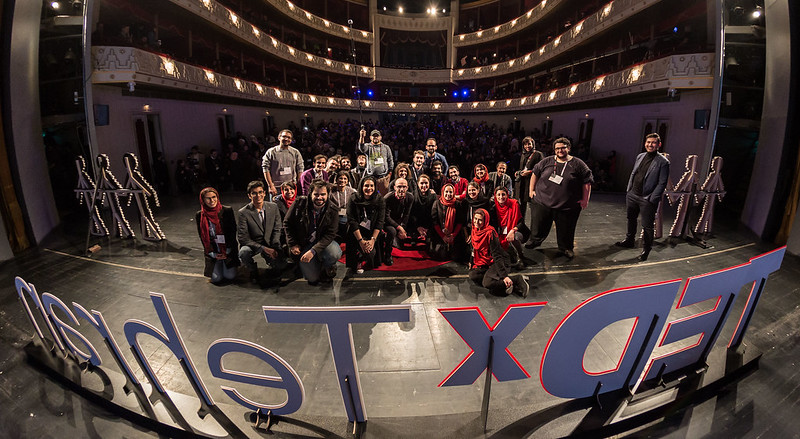
In this article, I will discuss the main elements of organizing a TEDxTehran event. Then I’ll describe how we plan for each and what important details we address to make sure the TEDxTehran event will be organized perfectly.
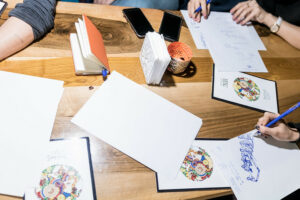
Gathering of TEDxTehran team to brainstorm TEDxTehran 2017., January 13, 2016. Photo: Ali Taheri / TEDxTehran
We set goals for every event we organize and align our goals with TED’s vision (sharing ideas worth spreading).
One of the main factors we always consider while setting event goals is for them to be SMART. In other words, we make sure they are Specific, Measurable, Achievable, Relevant, and Time-based.
Another factor we consider while setting goals is our TEDx license type. For example, the goal of a TEDxTehranWomen event may be different from the goal of a TED Countdown event.
Also, we consider the theme of our event to set more specific and relevant goals. We make sure our goal describes the theme of our event and the event’s theme describes our goal.
The KPIs of the events though, don’t usually change from event to event. We measure indicators that show us how much impact we made with each event.
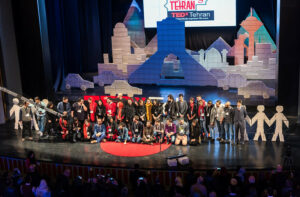
Team of TEDxTehran 2016, December 20, 2016, Vahdat Hall, Tehran, Iran. Photo: Hamid Ghodrati / TEDxTehran
The first and most primary step we pay close attention to is our team. We prioritize maintaining a team of active and enthusiastic people who care for the goals of our events.
We have a core team that consists of volunteers working throughout the year for all events we organize. Our event-day volunteers, on the other hand, only join us one week before the event. They get on board by the core team to be ready for hosting on the day of the event.
Our core team includes 6 smaller teams. Each of these teams has various projects inside as the activities in that team require. Following, you can read about each team:
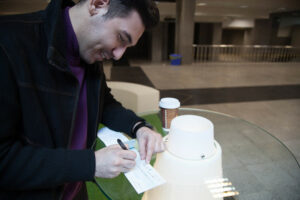
TEDxTehran 2015 – New Paradigm – December 4, 2015, Razi International Conference Hall, Tehran, Iran. Photo: Alireza Mokhtari/TEDxTehran
As soon as we receive the license of our event, our partnerships team starts to budget the event based on the size and requirements. It then updates our partnerships opportunities document and approaches our partners’ community with it.
It continues approaching until all the money requirements are fulfilled.
A big part of the money we spend goes to our event’s venue. Therefore finding a suitable venue is among the first actions that our partnership team focuses on. Finding a suitable venue that is also willing to be a partner, has usually helped us save some budget for better and more activities/swags for the event.

TEDxTehran 2015 – New Paradigm – December 4, 2015, Razi International Conference Hall, Tehran, Iran. Photo: Nooshafarin Movaffagh/TEDxTehran
Our curation team starts finding and approaching potential speakers as soon as we receive our event license. When a speaker’s draft is approved by our directors, the duration team brings that speaker onboard, assigns a curator, and starts curating them.
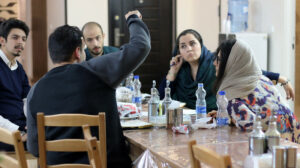
TEDxTehran 2015 – New Paradigm – December 4, 2015, Razi International Conference Hall, Tehran, Iran. Photo: Nooshafarin Movaffagh/TEDxTehran
When we receive our event’s license, our event management team creates a copy of our event planning chart and customizes it to our event. As the next step, the event management team schedules weekly short meetings with all the project managers to coordinate the actions and make sure all of our projects are going as the plan.
The weekly projects meetings will continue until the week before the event.
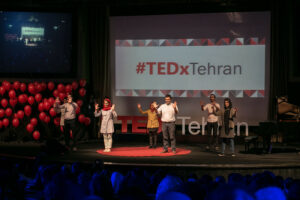
TEDxTehran 2015 – New Paradigm – December 4, 2015, Razi International Conference Hall, Tehran, Iran. Photo: Farnud Fathi/TEDxTehran
As soon as we receive the event’s license, our communication team designs and launches campaigns to communicate our event theme with our audience. It also shares the news and engaging posts to keep our audience more connected and engaged.
When the venue and a good part of our budget are secure, we open registrations. Our audience will then apply to attend our events. In other words, when someones fill in our application form, we want to know why they’re willing to attend our TEDx event. The intentions talk a lot, so more ambitious applicants will be approved to purchase tickets.
We announce our event by sending newsletter emails and posting on our social media and website. So attendees can apply to attend and then buy tickets on our website.
Also, when the curation team confirms a speaker is ready (to announce), our communication team starts the announcement through our online channels (website, social media, and mobile apps).
To announce the speaker line through emails, we usually wait until all the speakers are confirmed by the curation team and then start to publish them as one of the emails in our event’s marketing campaign.
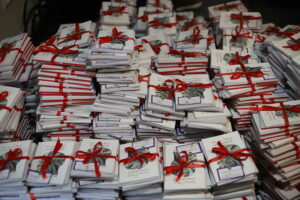
Backstage & Prepration at TEDxTehran 2019: Responsible Optimism, July 21, 2019, Milad Tower, Tehran, Iran. Photo: Nioofar Farhand/TEDxTehran
Experience design is one of the projects that is set up in our event management team. In this project, we design activities and visuals that bring a unified and appealing experience to our audience (usually) during the event. I added the adverb “usually” because sometimes it also designs these for the whole experience before, during, and after the event, especially in online events which need that sense of “engagement” and “connection”.
Other than activities, the experience design project builds signages, swags, stage, and venue decoration, and basically anything that brings a unified and appealing experience to the event.
In this stage, we’ll also start to finalize the schedule of the event which includes the timing of each talk and each break session.
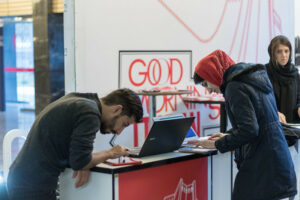
Team of TEDxTehran 2016, December 20, 2016, Vahdat Hall, Tehran, Iran. Photo: Fatemeh Allahyarnezhad / TEDxTehran
One week before the event all of our volunteers meet every other day to rehearse for the event.
The hosts and hostesses (mostly the event-day volunteers) get on board. They’ll visit the venue and learn how they can communicate and help the attendees.
The EMCEE(s) (who are curated by our curation team) will rehearse and learn how to introduce the talks and keep the stage plan going as planned.
The speakers will get ready by visiting the venue and (if the venue allows us) rehearse their talk on stage.
The partners will visit the venue and start setting up their booth for the creative activities they’ve designed (usually with the help of our experience-design team).
The technology team visits the venue to make sure everything is going as planned backstage. We also test the videos and gifs we want to play on the stage to make sure all is well.
The production team records all the above and provides feed to the communication team to share with our audience.
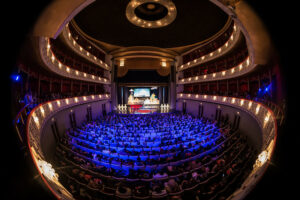
Audience members at TEDxTehran 2016, December 20, 2016, Vahdat Hall, Tehran, Iran. Photo: Hadi Khalese Nejad / TEDxTehran
On the day of the event, all team arrives at the venue early, get in place, and sets the venue ready for the attendees.
During the event, our partnerships team makes sure our partners are happy and their requirements are met. Our curation team makes sure the speakers and EMCEEs are ready and on time. Our event management team makes sure the attendees find their way into the venue and are having a good time. It also makes sure the event goes on as scheduled. Our technology team makes sure the stage schedule is going as planned and the live stream is working well. Our production and communication teams also record and share the moments of the event.
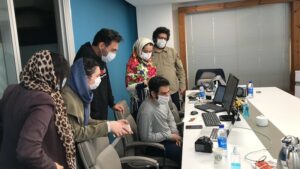
TEDxTehran COUNTDOWN Oct 30, 2020 : COUNTDOWN Oct 30, 2020 , Tehran, Iran , Online. Photos by TEDxTehran / Arya Khaksar
After the event, it’s time to party! We’ll invite the speakers, partners, and the team to join us and celebrate organizing a great event together.
The next most important step after the event is getting feedback. Apart from the NPS feedback we receive through TED’s platform, we ask our sponsors, speakers, and volunteers to give feedback so we can improve the next events.
Then the teams focus on publishing reports of the event. The most important report is the one we provide to our partners which includes how much we spent on the event and what quantitive outcomes the event had. Other reports include reports to the audience, speakers, and our team.
The final step is to transcribe and translate the talks as soon as they’re approved by TED and published on TEDx Official’s Youtube channel and TED.com. The goal is to have more impact by sharing our talks with English subtitles.
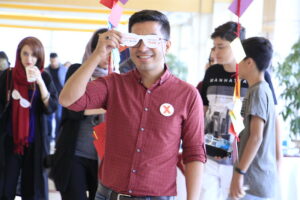
Volunteer Team at TEDxTehran 2019: Responsible Optimism, July 21, 2019, Milad Tower, Tehran, Iran. Photo: Zhantin Zahed]/TEDxTehran
In this article, I described the steps we at TEDxTehran pave when organizing a new event.
Hope it was helpful and if you have any feedback or comment, please keep in touch with me through my LinkedIn page.
You can apply via the link below:
https://tedxtehran.com/register/
https://tedxtehran.com/fa/register/

Written By: Mehrnoosh Baratpour
Edited And Published By: Sepideh Lashkari